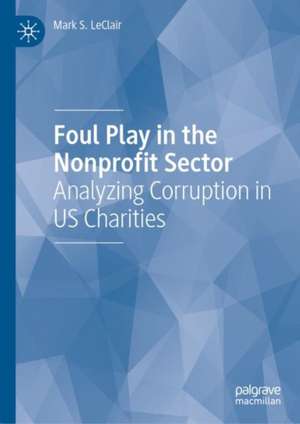Foul Play in the Nonprofit Sector: Analyzing Corruption in US Charities
Autor Mark S. LeClairen Limba Engleză Hardback – 5 oct 2024
This book explores the causes of malfeasance in the nonprofit realm. It examines how the current inadequate regulatory environment—together with inherent “agency” problems—can lead organizations astray as they turn away from fulfilling donor wishes to instead act in their own self-interest. The book highlights the distinction between “soft corruption” in the nonprofit sector and “hard corruption.” The former includes the misuse of donor funds that do not cross the line into illegality and the latter covers explicitly illegal misappropriation of contributions.
In Foul Play in the Nonprofit Sector, economist Mark S. LeClair provides constructive overviews regarding charity evaluation. Is it truly fair to judge nonprofits on their financials? The financial figures so frequently dictate the value of a nonprofit, and this often isn’t the best way to judge a charity’s performance. The manuscript includes suggestions for internal sectoral changes and regulatory reforms that can deter corruption at nonprofits.
Preț: 745.77 lei
Preț vechi: 819.54 lei
-9% Nou
Puncte Express: 1119
Preț estimativ în valută:
142.70€ • 148.99$ • 118.10£
142.70€ • 148.99$ • 118.10£
Carte tipărită la comandă
Livrare economică 31 martie-07 aprilie
Preluare comenzi: 021 569.72.76
Specificații
ISBN-13: 9783031669200
ISBN-10: 3031669207
Pagini: 250
Ilustrații: Approx. 250 p. 25 illus.
Dimensiuni: 148 x 210 mm
Ediția:2024
Editura: Springer Nature Switzerland
Colecția Palgrave Macmillan
Locul publicării:Cham, Switzerland
ISBN-10: 3031669207
Pagini: 250
Ilustrații: Approx. 250 p. 25 illus.
Dimensiuni: 148 x 210 mm
Ediția:2024
Editura: Springer Nature Switzerland
Colecția Palgrave Macmillan
Locul publicării:Cham, Switzerland
Cuprins
Preface.- 1. Nonprofit corruption: Description, causes, and effects.- 2Nonprofits by the numbers: Data overview and stakeholder interests.- 3. Misuse, misdemeanors, and felonies: The levels of nonprofit malfeasance.- 4. When philanthropy goes wrong: The role of agency problems and poor oversight.- 5. Internal controls and the external regulatory environment.- 6. Seeking solutions: Better oversight, self-regulation, or a new direction.
Notă biografică
Mark S. LeClair is Professor Emeritus of Economics at Fairfield University. He specializes in international and development economics and founded the master’s program in public administration. His recent research focuses on malfeasance in the nonprofit sector and the financial crisis in higher education. LeClair is the author of Philanthropy in Transition (2014).
Textul de pe ultima copertă
"Foul Play in the Nonprofit Sector extensively documents the way that charitable organizations misuse funds entrusted to them by donors. LeClair’s message to donors is that they should set aside the good feelings they get from making charitable donations and pay attention to where the money actually goes."
—Randall G. Holcombe, DeVoe Moore Professor of Economics, Florida State University, and author of Political Capitalism
This book explores the causes of malfeasance in the nonprofit realm. It examines how the current inadequate regulatory environment—together with inherent “agency” problems—can lead organizations astray as they turn away from fulfilling donor wishes to instead act in their own self-interest. The book highlights the distinction between “soft corruption” in the nonprofit sector and “hard corruption.” The former includes the misuse of donor funds that do not cross the line into illegality and the latter covers explicitly illegal misappropriation of contributions.
Foul Play in the Nonprofit Sector provides constructive overviews regarding charity evaluation. Economist Mark S. LeClair asks readers to consider the legitimacy of judging nonprofits on financial gains. The numbers so frequently create assumptions surrounding the worth of a nonprofit, but this is not a useful way to judge the performance of a charity.
The book includes suggestions for internal sectoral changes and regulatory reforms that can deter corruption at nonprofits.
Mark S. LeClair is Professor Emeritus of Economics at Fairfield University. He specializes in international and development economics and founded the master’s program in public administration. His recent research focuses on malfeasance in the nonprofit sector and the financial crisis in higher education. LeClair is the author of Philanthropy in Transition (2014).
—Randall G. Holcombe, DeVoe Moore Professor of Economics, Florida State University, and author of Political Capitalism
This book explores the causes of malfeasance in the nonprofit realm. It examines how the current inadequate regulatory environment—together with inherent “agency” problems—can lead organizations astray as they turn away from fulfilling donor wishes to instead act in their own self-interest. The book highlights the distinction between “soft corruption” in the nonprofit sector and “hard corruption.” The former includes the misuse of donor funds that do not cross the line into illegality and the latter covers explicitly illegal misappropriation of contributions.
Foul Play in the Nonprofit Sector provides constructive overviews regarding charity evaluation. Economist Mark S. LeClair asks readers to consider the legitimacy of judging nonprofits on financial gains. The numbers so frequently create assumptions surrounding the worth of a nonprofit, but this is not a useful way to judge the performance of a charity.
The book includes suggestions for internal sectoral changes and regulatory reforms that can deter corruption at nonprofits.
Mark S. LeClair is Professor Emeritus of Economics at Fairfield University. He specializes in international and development economics and founded the master’s program in public administration. His recent research focuses on malfeasance in the nonprofit sector and the financial crisis in higher education. LeClair is the author of Philanthropy in Transition (2014).
Caracteristici
Highlights the increase of corruption within 501(c)(3) not-for-profits Includes suggestions for internal changes and regulatory reform to reduce corruption within nonprofits Explains why judging a nonprofit on its financials is counterintuitive in more than just definition
